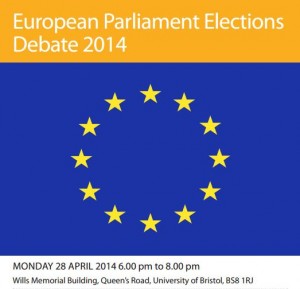
Dr Ana Juncos, Lecturer in European Politics, School of Sociology, Politics and International Studies
The next election to the European Parliament, the eighth contest since direct voting began in 1979, will take place over 22-25 May. This will be an important event in the history of the European Union. Many national elections in the past few years have witnessed governments ousted because of their handling of the economy and their support for austerity policies (namely in Greece and Cyprus, but also in France and Italy). However, this is the first time that citizens will have an opportunity to voice their opinions in a ballot on the handling of the Eurozone debt crisis at the European as opposed to the national level.

Michelle Cini, Professor of European Politics, School of Sociology, Politics and International Studies
Moreover, for the first time in its history, more than 400 million European citizens will have a chance to decide not only on the composition of the European Parliament, but also about who might become the chief of the European executive, the President of the European Commission. Even if the Commission’s role is said to be weaker than it was in the past, the incoming President will nonetheless play a key role in deciding the future direction of political and economic integration in the EU. With the entry into force of the Lisbon Treaty in late 2009, the European Council composed of the Heads of State and Government of the 28 member states now proposes a President of the Commission to the European Parliament, ‘taking into account the elections to the European Parliament’. For many this represents the first opportunity for a truly pan-European election.
Sadly, at least for pro-Europeans supportive of the Lisbon Treaty reforms, these elections are also likely to see the rise of Eurosceptic parties across Europe. It is widely predicted that parties critical of the EU from the right and from the left will do well in the next elections at the expense of those positioned at the centre-ground of European politics, and particularly liberal parties. What it is less clear however is how this might impact European politics in the longer term. Some see these parties acting in concert as the new European Tea Party movement akin to its American counterpart in blocking legislative initiatives. The most likely scenario will be one where Eurosceptic parties will be unable to act cohesively in the 2014-2019 European Parliament (EP) owing to institutional and political constraints – for instance, a minimum of 25 Members of the European Parliament (MEPs) from at least seven states is required to be able to form a group – and, more importantly, because even though they share some common ground they still constitute a very diverse bunch.
When we look back at past European Parliament elections fought in the UK since 1979 there has been relatively little interest exhibited by the electorate in the pre-election campaigns. This has been reflected in the turnout data which has generally been low, exemplified by the particularly dismal 34.7% of the electorate coming out to vote in the last EP elections in 2009. Beyond viewing these second-order elections as opportunities to protest against the incumbent government, European Parliament elections have not generated much enthusiasm at all. An interesting question is whether the 2014 elections will be different. Pro-Europeans in the past have complained that European elections are rarely about European issues. Given the rising fortunes of the UK Independence Party (UKIP), this may well turn out to be a ‘be careful what you wish for’ election, with pro-Europeans nostalgic for the good-old-days of protest voting when Europe was rarely discussed at all during the electoral campaign.
The reason why Europe has become an issue for this election can be attributed to the rise of UKIP, which – depending on which opinion poll one reads – is likely to reap between 20% and 30% of the vote on 22 May. This could place UKIP in second place to the Labour Party, and might even create a situation in which Labour and UKIP gain a roughly equivalent proportion of the final vote. There is no doubt that UKIP’s success will cut into the Conservative Party’s traditional support base, probably pushing it into third place. The Liberal Democrats will slump further, discredited by the Coalition, and little helped by their leader’s courageous attempt to argue the pro-European line in his two recent debates with the UKIP leader, Nigel Farage.
So, with Labour and the Liberal Democrats arguing more of a pro-European line, this could at last turn out to be a European election which is primarily about Europe, and more specifically about the UK’s future role within the EU. Understandably, all eyes are on UKIP, with the UK debate reflecting the in/out/renegotiate agenda set in David Cameron’s speech of January 2013. But let’s not exaggerate the shift in focus in these elections, important as the debate clearly is. What UKIP has done is to bring the campaign debate into sync with the broader dominant political (elite, media, public) discourse on Europe within the UK – little more than that. So while the elections in the UK are about Europe and the UK’s role within it, they are still not about pan-European issues. So even if this post-Lisbon election provides the UK electorate with a first opportunity to engage in a truly pan-European election, the campaign is likely to remain – for the UK – a somewhat parochial affair.
Join us for a European Parliamentary Elections Hustings, at the University of Bristol, this coming Monday, 28th April at 6 p.m. Follow the link for details about the event and registration or read further information about this one-off event.

